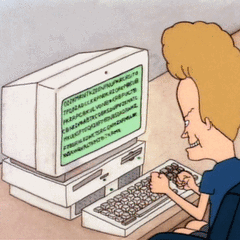
michrech
-
Posts
146 -
Joined
-
Last visited
Reputation Activity
-
 michrech got a reaction from Brain5454 in 2 Gamers, 1 CPU - Virtualized Gaming Build Log
michrech got a reaction from Brain5454 in 2 Gamers, 1 CPU - Virtualized Gaming Build Log
Your CPU supports VT-d and VT-x, so it'll be fine, so long as your mainboard also supports VT-d. That CPU is only 4 core / 4 thread, so you wouldn't have as many resources available to give to each VM as someone with a 4 core CPU with hyper-threading. Under unRAID, you'd be able to make use of your 980 and 970, but not both in a single VM -- they'd need to be assigned to separate VMs.
As to your drives, you will certainly need to wipe them *and* re-install your guest OS (in your case, Windows 10).
-
 michrech got a reaction from ChrisCross in 7 Gamers, 1 CPU - Ultimate Virtualized Gaming Build Log
michrech got a reaction from ChrisCross in 7 Gamers, 1 CPU - Ultimate Virtualized Gaming Build Log
The hypervisor unRAID uses provides a "network bridge" that allows the VM's to share one NIC. In a case where you didn't have 7 graphics cards, you could add more network interfaces and directly assign them to each VM, if you wanted / needed.
-
 michrech reacted to unusualfire in 7 Gamers, 1 CPU - Ultimate Virtualized Gaming Build Log
michrech reacted to unusualfire in 7 Gamers, 1 CPU - Ultimate Virtualized Gaming Build Log
If they are taking this to an international consumer electronics show. The spaces saved would be incredible compared to 7 full PC's.
-
 michrech got a reaction from TheDj408 in RAID 1 for backup?
michrech got a reaction from TheDj408 in RAID 1 for backup?
I think what folks are trying to say here is that RAID is for data redundancy / system availability (except for RAID0), *not* backup. With a RAID array, you could lose all of your HDD's (in your case, two), and you'd have no backup of the data. With a RAID 1 array, if you had corrupted data written to the array, it'd be mirrored to both drives. This is what backups (separate from the array) are for.
To answer your question -- yes, you can use differently branded HDDs in your array, so long as they are of similar size. Just keep in mind that the array will only be as fast as the slowest drive in the array.
If you want an actual backup, you can accomplish this in a number of ways, the simplest / cheapest probably being connecting an external HDD to your computer. Once this is done, you can either manually copy your data to your external, or use software (like Macrium's Reflect, or a number of others) to perform backups on a schedule.
-
 michrech got a reaction from Blake in Good enough for a basic NAS?
michrech got a reaction from Blake in Good enough for a basic NAS?
Says who? I have three 1TB Barracudas in what is essentially a JBOD array and they're doing fine... If the array isn't being hammered 24/7, desktop drives will work perfectly well. I mean, if they're good enough for a boot / OS drive, why can't they work in a NAS?
-
 michrech got a reaction from Acolyte_of_PC in 2 Gamers, 1 CPU - Virtualized Gaming Build Log
michrech got a reaction from Acolyte_of_PC in 2 Gamers, 1 CPU - Virtualized Gaming Build Log
A year ago this month, I actually built a system similar to what's in the video that spawned this forum thread (though with hardware no where near as powerful) because I had too many project PC's sitting around the house, all doing one or two things, using no where near all the horsepower of the rigs in which they were housed, while sucking up a bunch of power and creating a bunch of noise. In the end, I reclaimed a bit of storage space, my electric bill noticeably lowered, and I sold off some of the parts from the individual systems to off-set the bits I picked up to build for the VM host (which runs ESXi 6 instead of UNraid).
A side benefit was lowering the noise level in the house. All the individual machines I had running were, I thought, pretty quiet. I didn't realize how much noise there was until they were all powered down... lol Having noise in the house isn't an issue for me, since I live alone, but for anyone with a significant other / kids, this could be a good thing.
-
 michrech got a reaction from Clear17Mud in Why are so many people against raid 0?
michrech got a reaction from Clear17Mud in Why are so many people against raid 0?
I think the better term might be "out dated". In my 6 drive JBOD array (Gooo DrivePool!), the only drives I've had fail are WD's. They also ran several degrees warmer than the 3 Seagates (I posted about this, and the drive temperatures, a week or two ago).
On my window sill at work, I have a stack of failed WD Blue HDD's that were pulled from our Dell Optiplex workstations (mostly in the 160GB range, though occasionally some 250's showed up). Rarely ever does a Seagate come across my desk...
Right now I have three 1TB Seagates, a 1TB Hitachi, a 1TB WD Green (all 3.5"), and a 2.5" 2TB Seagate Spinpoint. Over the next few months, the rest of the 3.5" disks will be replaced with 2TB 2.5"s, and none will be from WD's umbrella...
Also, to keep my post on topic -- the primary datastore in my ESXi 6 host is a RAID0 that includes three 240GB SSD's.
-
 michrech reacted to 79wjd in Why are so many people against raid 0?
michrech reacted to 79wjd in Why are so many people against raid 0?
Seagates failure rates aren't exactly high.
-
 michrech reacted to ddswh1pk0s in Dividing programs on HDD
michrech reacted to ddswh1pk0s in Dividing programs on HDD
the logic is strong on this thread... Can't afford a hard drive but can afford a raid card. If you can't afford a hard drive then getting BO3 shouldn't be your priority
-
 michrech got a reaction from vanlooverenkoen in 2 Gamers, 1 CPU - Virtualized Gaming Build Log
michrech got a reaction from vanlooverenkoen in 2 Gamers, 1 CPU - Virtualized Gaming Build Log
Yes, you can place the VM's on separate HDD's.
-
 michrech reacted to Vaellera in A testament to Seagate
michrech reacted to Vaellera in A testament to Seagate
That's surprising, I've actually had more issued with WD drives than seagate
-
 michrech reacted to ZetZet in A testament to Seagate
michrech reacted to ZetZet in A testament to Seagate
if a drive fails every 24 hours you are doing something wrong. Or seagate is a genius company and they can make 730 drives for the cost of one and replace them every day while still turning profit.
-
 michrech got a reaction from Lachlan2104 in Home Server... or Media Center?
michrech got a reaction from Lachlan2104 in Home Server... or Media Center?
Unless space is at a premium, I would suggest a case with more drive bays / more room to route cables. It looks like the case you chose *can* have three 3.5" HDD's which, depending on how much media you plan to store, might be just fine.
As for the software -- it doesn't look like you're invested in anything specific yet, just going by what you've posted in your very first post in this thread. I happen to *really* like Plex Media Server for home theater use, especially since you mentioned using it with other devices on your network. Plex has Android, Android TV, and iOS apps that will let you play media from the server. FreeNAS, should you go that route, does have a Plex Media Server plugin, so it'd be easy to set up / use.
Additionally, if I'm reading your original post correctly, it sounds like you might be wanting to use the system you're building as the HTPC itself. I don't believe this'll work with something like FreeNAS, since it'll just output the linux console via the PC video card. If this is the case, you'll probably want to run Windows as your host OS. You can use the Windows 8 / 10 storage spaces to pool your storage drives, Windows' built in RAID functionality, or a software like DrivePool. Going this route, if you go with Plex, you can install the Plex Media Server and Plex Home Theater software, then configure the system to auto-start Plex Home Theater on startup. Being Windows, you can also install whatever your favorite bittorrent software happens to be quite easily.
With Plex Media Server, it can actually push your media to phones / computers / tablets both within and outside your home. If the devices you're using can't play the original media natively, Plex Media Server will transcode for the device. This does require some CPU power, though. I'm not familiar with the particular CPU you've chosen, so I can't tell you how well it'll handle this service. I can tell you I had no issues with at least two devices needing transcoding on my i5-2300 (the system I was using for all this before I moved it into a VM in my ESXi server).
What I do in my own home:
My 'storage server' is a Windows system (in my case, WHS2011, since I picked it up a couple years ago for $50, but it could be any version of Windows). I have StableBit's DrivePool installed, and my storage pool currently consists of 6 1TB 3.5" HDD's (I'm currently in the process of upgrading to 4 2.5" 2TB HDD's, and have the first one being delivered today! YAY!). I have Plex Media Server, sabnzbd, Sonarr, and Couch Potato installed on it. Sonarr / Couch Potato are configured to tell sabnzbd to grab whatever it is I'm wanting, unpack it, automatically move it to the TV / Movies folders, then notify Plex Media Server to rescan the library. This way, whenever things are downloaded / available, I can just plop down on my couch and get to watching.
The nice thing with StableBit's DrivePool is that I can add drives (of different interfaces and sizes!) to the pool, and they're all presented to the OS as one big drive (mine is currently just under 6TB). When space starts to get tight, I can tell DrivePool to 'remove' the smallest drive from the pool (DrivePool automagically moves the data onto the remaining drives in the pool, so you will need to make sure the pool has at least as much free space as the size of the drive you're removing). I can then remove the drive, then replace it with a larger one, add it to the pool, and keep on keepin' on.. If I'm worried about losing data, I can tell DrivePool to duplicate directories to two (or more) drives in the pool. This way, if one (or more) drives die, it's unlikely that I'll lose whatever I wanted to keep safe. You can't do any of this with (hard/soft)ware RAID.
To access my media -- since I don't want a bunch of fans whirring / carrying on in my living room, and don't want (more) big boxes sitting on my TV stand, I use a Nexus Player on both my living room and bed room TV's. Both have the Plex app installed (which is apparently now free for Android TV - just got an email about this yesterday), and since they came with a nice BT remote, so I don't have to do extra work to make a remote work on an HTPC. I use 3M mounting strips to attach the Nexus Player to the back of each TV, and then route the cables through the wall cavity. this keeps everything as nice / neat as possible.
My 'storage server' lives in a closet in my spare bedroom, which keeps all the noise in there.
There is a lot to this post -- if you have specific questions, please feel free to ask.
-
 michrech got a reaction from Mikensan in Is it possible to have a 1tb+2tb then 3tb drive raid 1 config?
michrech got a reaction from Mikensan in Is it possible to have a 1tb+2tb then 3tb drive raid 1 config?
With RAID, you cannot do what you're asking. RAID (save for JBOD) requires all the drives in the set to be of the same size. Whatever size the smallest drive in the set happens to be, is what all drives in the set will appear to be.
-
 michrech got a reaction from Flight1sim in Storage Server/NAS help
michrech got a reaction from Flight1sim in Storage Server/NAS help
The R900 is loud, even at idle (though not as loud as the HP's, from what I have heard). I had two of them. The controller that was in the R900's I had was either a PERC 5 or 6 (I forget), and there are a ton of both (in the I and E varieties) on eBay -- if you can't find them, your eBay Search-Fu is *severely* lacking.
If you have a few extra bucks, the Dell R710 is an excellent choice for a home server. It has a option for 6 3.5" drives or 8 2.5" (I have the 2.5" version), and it's quite quiet, even under a moderate load. According to the vSphere client, mine is usually in the 200w range at idle.
-
 michrech got a reaction from Sithhy in Laptop HDD to USB
michrech got a reaction from Sithhy in Laptop HDD to USB
I've had mostly bad luck with the adapter you linked. You should probably look for one of these : http://amzn.com/B004ID6J0K -- I've used many of them, and they work exceptionally well.
You mentioned a desire to put it into an external enclosure -- if you can't find a good 2.5" IDE enclosure for it, you can buy one of these : http://amzn.com/B00K86R9F0 -- I have one, and it works quite well. It'll allow you to mount your 2.5" drive right into a 3.5" IDE USB enclosure.
-
 michrech got a reaction from Raven-- in Laptop HDD to USB
michrech got a reaction from Raven-- in Laptop HDD to USB
I've had mostly bad luck with the adapter you linked. You should probably look for one of these : http://amzn.com/B004ID6J0K -- I've used many of them, and they work exceptionally well.
You mentioned a desire to put it into an external enclosure -- if you can't find a good 2.5" IDE enclosure for it, you can buy one of these : http://amzn.com/B00K86R9F0 -- I have one, and it works quite well. It'll allow you to mount your 2.5" drive right into a 3.5" IDE USB enclosure.
-
 michrech got a reaction from scottyseng in RAID 5 expandability
michrech got a reaction from scottyseng in RAID 5 expandability
If you're in Windows, and want a big storage pool with available redundancy and expandability, take a look at StableBit's DrivePool.
You have redundancy on a per-folder basis (you can set each folder to be duplicated on two, or more, disks in the pool), and you *don't* have to deal with RAID. The drives are all NTFS formatted, so if the PC dies, or you decide you hate DrivePool, you can remove them from the system and still access the data. Best of all, you can increase / decrease the pool as needed. Even better, the drives don't all have to be the same size! Lastly, the pool shows up as a single drive letter.
No, I don't work for StableBit, but I do have three licenses. I'd be glad to answer any questions you have, if any, to the best of my ability.
-
 michrech reacted to multifrag in Should I just buy an SSD for my laptop or save to build a crappy computer?
michrech reacted to multifrag in Should I just buy an SSD for my laptop or save to build a crappy computer?
If your laptop has a dvd reader you can always put your 750GB in it with a special bracket. There is little to no point in buying a crappy. For that price its either laptop or used pc from something like scrapyard wars
-
 michrech got a reaction from João Severino in 2 Gamers, 1 CPU - Virtualized Gaming Build Log
michrech got a reaction from João Severino in 2 Gamers, 1 CPU - Virtualized Gaming Build Log
Replies in-line:
-
 michrech reacted to Imakuni in can i use ssd and internal hdd in same pc ?
michrech reacted to Imakuni in can i use ssd and internal hdd in same pc ?
By "good", you mean "overpriced for regular consumers needs", right?
-
 michrech got a reaction from Octavialicious in $500 Server/NAS Help
michrech got a reaction from Octavialicious in $500 Server/NAS Help
If you don't have a place you can put this server, where it's away from everyone else, DO NOT get the 2950. They are LOUD, even at idle. Also, later on in the thread you mentioned possibly using Windows 7 on the 2950 -- don't, as Windows 7 is limited to one CPU, so the second will go unused. You'll need to use Windows server, some form of Linux / BSD, or a hypervisor (MS's Hyper-V, VMware ESXi, or XenServer).
If you want a Xeon processor in a system that's fairly cheap *AND QUIET*, go for an HP Z800. There is one on eBay (as of this writing) for $415 with free shipping : http://www.ebay.com/itm/HP-Z800-Workstation-1x-HC-Xeon-X5675-3-06GHz-8GB-500GB-w-Win-7-Quadro-2000-/371451628683?hash=item567c3e0c8b
It's an excellent system for use with ESXi and pcipassthrough (I have this same system). I have a WHS2011 VM, and I've passed an eSATA controller (which I added), the onboard 6 port SAS/SATA controller, and a USB3 controller (which I also added). This VM serves as my storage (5 1TB SATA HDDs with Stablebit Drivepool), Plex Media Server, and Sonarr / sabnzb. I also have a 'gaming' VM set up, which has a Radeon 6970 and a pair of USB ports attached, and a third VM with just a video card connected to a projector for tabletop RPG gaming.
It's an excellent setup, can hold four 3.5" SAS/SATA HDD's internally, and if you remove the CD-ROM, you can put in a "4-in-3" dock that will allow you to mount 4 more 3.5" SATA disks in the 3 5.25" bays.










